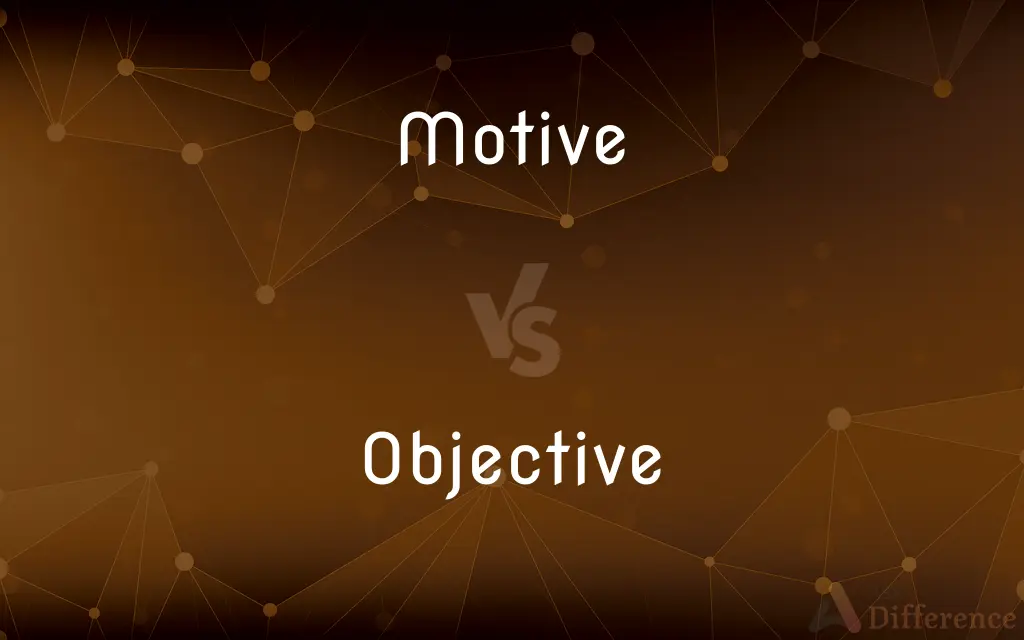Motive vs. Objective — What's the Difference?
By Tayyaba Rehman & Fiza Rafique — Updated on April 17, 2024
Motive refers to the underlying reason for an action, driven by emotional or psychological desires, whereas an objective is a specific, often measurable goal.

Difference Between Motive and Objective
Table of Contents
ADVERTISEMENT
Key Differences
A motive is fundamentally the psychological impetus that prompts a person to act in a certain way, rooted in desires or emotional needs. On the other hand, an objective is a clear, defined target or outcome that someone aims to achieve, typically framed within specific parameters like time.
Motives are often internal and subjective, influencing decisions and behaviors from within. Whereas objectives are external benchmarks set to guide actions towards a tangible result or achievement.
Understanding one's motive can involve introspection and reflection on personal desires and fears. In contrast, setting objectives usually requires planning and strategizing, focusing on practical steps and measurable milestones.
In legal and psychological contexts, motives are scrutinized to understand the deeper layers of human behavior and intent. Conversely, objectives are crucial in business and project management to establish clear, actionable goals.
Motives can be complex and multi-faceted, often not immediately apparent even to the person acting upon them. Objectives, however, are straightforward and designed to be understood and communicated clearly across teams or individuals.
ADVERTISEMENT
Comparison Chart
Definition
The psychological reason behind an action
A specific goal or target to be achieved
Nature
Internal and subjective
External and objective
Focus
Desires, emotions, personal needs
Tangible results, clear outcomes
Role in Decision-Making
Influences personal choices and actions
Guides planning and measurable steps
Common Contexts
Psychology, law
Business, project management
Compare with Definitions
Motive
Driving force behind an action.
His motive for volunteering was to gain experience.
Objective
Specific goal or targetTheir main objective was to increase sales by 20%.
Measurable achievement in a project.
Motive
Emotional or ideological cause.
Their motives were questioned after the incident.
Objective
The project's objective was clearly defined in the brief.
Aim or end point in a plan.
Motive
Underlying psychological impetus.
The criminal's motive was rooted in revenge.
Objective
Their objective was to capture a larger market share.
Clear, actionable step towards a larger goal.
Motive
Reason based on personal desires.
Her motive to help stemmed from empathy.
Objective
Clear, actionable step towards a larger goal.
The meeting's objective was to streamline the workflow.
Motive
Basis for behavior in narrative contexts.
The character's motive was unveiled as the plot thickened.
Objective
His objective was to finish the marathon.
Strategic intent in business.
Motive
An emotion, desire, physiological need, or similar impulse that acts as an incitement to action.
Objective
Existing independent of or external to the mind; actual or real
Objective reality.
Motive
(mōtĭv, mō-tēv) A motif in art, literature, or music.
Objective
Based on observable phenomena; empirical
Objective facts.
Motive
Causing or able to cause motion
Motive power.
Objective
Uninfluenced by emotions or personal prejudices
An objective critic.
Motive
Causing an action
Motive pleas.
Objective
A thing or group of things existing independent of the mind.
Motive
(obsolete) An idea or communication that makes one want to act, especially from spiritual sources; a divine prompting.
Objective
The objective case.
Motive
An incentive to act in a particular way; a reason or emotion that makes one want to do something; anything that prompts a choice of action.
Objective
A noun or pronoun in the objective case.
Motive
A limb or other bodily organ that can move.
Objective
The primary optical element, such as a lens or mirror, in a microscope, camera, telescope, or other optical instrument, that first receives light rays from the object and forms the image. Also called object glass, objective lens, object lens.
Motive
(law) Something which causes someone to want to commit a crime; a reason for criminal behaviour.
What would his motive be for burning down the cottage?
No-one could understand why she had hidden the shovel; her motives were obscure at best.
Objective
Of or relating to a material object, actual existence or reality.
Motive
A motif.
Objective
Not influenced by the emotions or prejudices.
Motive
(music) A motif; a theme or subject, especially one that is central to the work or often repeated.
If you listen carefully, you can hear the flutes mimicking the cello motive.
Objective
Based on observed facts; without subjective assessment.
Motive
(transitive) To prompt or incite by a motive or motives; to move.
Objective
(grammar) Of, or relating to a noun or pronoun used as the object of a verb.
Motive
Causing motion; having power to move, or tending to move
A motive argument
Motive power
Objective
Of, or relating to verbal conjugation that indicates the object (patient) of an action. In linguistic descriptions of Tundra Nenets, among others.
Motive
Relating to motion and/or to its cause
Objective
A material object that physically exists.
Motive
That which moves; a mover.
Objective
A goal that is striven for.
Motive
That which incites to action; anything prompting or exciting to choise, or moving the will; cause; reason; inducement; object; motivation{2}.
By motive, I mean the whole of that which moves, excites, or invites the mind to volition, whether that be one thing singly, or many things conjunctively.
Objective
(grammar) The objective case.
Motive
The theme or subject; a leading phrase or passage which is reproduced and varied through the course of a comor a movement; a short figure, or melodic germ, out of which a whole movement is develpoed. See also Leading motive, under Leading.
Objective
(grammar) a noun or pronoun in the objective case.
Motive
That which produces conception, invention, or creation in the mind of the artist in undertaking his subject; the guiding or controlling idea manifested in a work of art, or any part of one.
Objective
The lens or lenses of a camera, microscope, or other optical device closest to the object being examined.
Motive
Causing motion; having power to move, or tending to move; as, a motive argument; motive power.
Objective
Of or pertaining to an object.
Motive
To prompt or incite by a motive or motives; to move.
Objective
Of or pertaining to an object; contained in, or having the nature or position of, an object; outward; external; extrinsic; - an epithet applied to whatever is exterior to the mind, or which is simply an object of thought or feeling, as opposed to being related to thoughts of feelings, and opposed to subjective.
In the Middle Ages, subject meant substance, and has this sense in Descartes and Spinoza: sometimes, also, in Reid. Subjective is used by William of Occam to denote that which exists independent of mind; objective, what is formed by the mind. This shows what is meant by realitas objectiva in Descartes. Kant and Fichte have inverted the meanings. Subject, with them, is the mind which knows; object, that which is known; subjective, the varying conditions of the knowing mind; objective, that which is in the constant nature of the thing known.
Objective has come to mean that which has independent existence or authority, apart from our experience or thought. Thus, moral law is said to have objective authority, that is, authority belonging to itself, and not drawn from anything in our nature.
Motive
The psychological feature that arouses an organism to action toward a desired goal; the reason for the action; that which gives purpose and direction to behavior;
We did not understand his motivation
He acted with the best of motives
Objective
Unbiased; unprejudiced; fair; uninfluenced by personal feelings or personal interests; considering only the facts of a situation unrelated to the observer; - of judgments, opinions, evaluations, conclusions, reasoning processes.
Objective means that which belongs to, or proceeds from, the object known, and not from the subject knowing, and thus denotes what is real, in opposition to that which is ideal - what exists in nature, in contrast to what exists merely in the thought of the individual.
Motive
A theme that is elaborated on in a piece of music
Objective
The objective case.
Motive
Causing or able to cause motion;
A motive force
Motive power
Motor energy
Objective
The goal intended to be attained (and which is believed to be attainable);
The sole object of her trip was to see her children
Motive
Impelling to action;
It may well be that ethical language has primarily a motivative function
Motive pleas
Motivating arguments
Objective
The lens or system of lenses nearest the object being viewed
Objective
Undistorted by emotion or personal bias; based on observable phenomena;
An objective appraisal
Objective evidence
Objective
Serving as or indicating the object of a verb or of certain prepositions and used for certain other purposes;
Objective case
Accusative endings
Objective
Emphasizing or expressing things as perceived without distortion of personal feelings or interpretation;
Objective art
Objective
Belonging to immediate experience of actual things or events;
Concrete benefits
A concrete example
There is no objective evidence of anything of the kind
Common Curiosities
What is a motive?
A motive is the underlying psychological reason that drives a person to act.
What is an objective?
An objective is a specific goal or target someone strives to achieve.
Can a person have multiple motives?
Yes, individuals can have complex, overlapping motives affecting their actions.
What role do objectives play in business?
Objectives help set specific, measurable goals crucial for strategic planning and achieving business outcomes.
How do motives influence behavior?
Motives drive behavior by influencing decisions based on personal desires or emotional needs.
Are objectives always quantifiable?
While not always quantifiable, objectives are generally structured to be measurable to track progress effectively.
How are objectives set in a project?
Objectives in a project are set through careful planning, often using SMART criteria—Specific, Measurable, Achievable, Relevant, Time-bound.
How can understanding motives help in personal development?
Understanding personal motives can lead to better self-awareness and more aligned decision-making.
How do motives differ in psychological vs. legal contexts?
In psychology, motives are analyzed to understand emotional and mental states; in law, they help determine intent or culpability.
Can objectives change over time?
Yes, objectives can be adjusted based on new information, changing circumstances, or shifts in priorities.
Share Your Discovery

Previous Comparison
Memento vs. Souvenir
Next Comparison
Fragrance vs. FragrantAuthor Spotlight
Written by
Tayyaba RehmanTayyaba Rehman is a distinguished writer, currently serving as a primary contributor to askdifference.com. As a researcher in semantics and etymology, Tayyaba's passion for the complexity of languages and their distinctions has found a perfect home on the platform. Tayyaba delves into the intricacies of language, distinguishing between commonly confused words and phrases, thereby providing clarity for readers worldwide.
Co-written by
Fiza RafiqueFiza Rafique is a skilled content writer at AskDifference.com, where she meticulously refines and enhances written pieces. Drawing from her vast editorial expertise, Fiza ensures clarity, accuracy, and precision in every article. Passionate about language, she continually seeks to elevate the quality of content for readers worldwide.














































